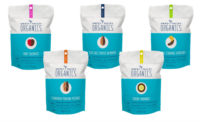Now, more than ever, consumers want to work with and buy from trustworthy brands. Part of that trust is built based on how a brand culturally identifies with them. Not to mention, the multicultural population has almost $4 trillion in spending power in the U.S. alone.
As consumer preferences and social values continue to shape purchasing decisions, here are three strategies for marketers to reach today's multicultural consumer.
1. Start and live by your purpose.
While this may seem like "table stakes," successful brands must be grounded in purpose. Knowing what you stand for and remaining laser-focused on authenticity is critical to start, grow and scale any brand.
Kellogg Company has always been a purpose-driven organization—feeding programs for children, protecting our planet, promoting wellbeing, and driving equity, diversity, and inclusion (ED&I) across every stakeholder we reach. Our purpose is to create better days and a place at the table for everyone. We start every project with that foundation, and that discipline allows us to be more creative in food design and communication design because we know what we stand for.
We're creating opportunities within the community that infuse cultural relevance and greater sensitivity into how we develop our foods. We've brought inclusiveness to life with NaviLens technology, which helps visually impaired consumers understand the ingredients listed on our packaging. Similarly, our "Chef in Residence" program is a paid postgraduate fellowship for Black chefs to work with our research and development (R&D) team to help them better understand food's role in Black communities worldwide.
2. Increase representation and upskilling initiatives.
It's been proven that diversity of thought, perspective, and background drives better business outcomes. Kellogg has several ED&I initiatives, two of which are core to how we best reach our diverse consumer populations.
First is our Business Employee Resource Groups (BERGs). These groups are prevalent across many companies and help sensitize employees to the cultural norms and behaviors of diverse groups. Research shows BERGs are good for business as they boost company culture, support employee retention and recruitment efforts, and, most importantly, build a workforce that reflects diverse consumers.
Second is our award-winning K Way of Inclusive Marketing Program, where we're continually educating our marketers on multicultural and inclusive audiences so that we can delight them with our products, communications, and brand experiences. The insights gleaned from the program go beyond consumers' shopping and digital habits; we seek to understand our consumers' passions, communities, and lives to relate to them on a deeper level.
One insight gleaned from the program is that Cheez-Its' most significant consumption gap is with teens and young adults. We learned we needed to rethink how we reached those consumers in a culturally relevant way.
As a result, Kellogg partnered with Pandora to curate a hip-hop playlist that was played for six months while we aged a special batch of cheese to infuse the taste of hip-hop in the cheese. We also partnered with hip-hop icon Sway Calloway to create a Cheez-It x Pandora Aged by Audio sponsored new YouTube series, "Living Legendz," which focused on the cultural impact of hip-hop.
The award-winning campaign was a success, we sold 50% of the Cheez-It x Pandora boxes in the first 12 hours and saw a 1700% increase in website traffic, all while reaching a new, diverse audience through aligning the business opportunity with consumers' passion points.
3. Turn data insights and action.
It's no surprise that data and analytics allow for greater personalization with consumers at scale. When we understand a consumer's motivations and buying behavior, we can vary our messages by the audience and drive conversion.
With media inflation on the rise and a lack of first-party data, we've begun to leverage clean room software to reach addressable audiences. Our data tells us that Pringles is quite popular among gamers as it's a great one-handed snack.
We wanted to dig deeper and built a clean room that brought together a mix of data to analyze 20 million addressable records and identified four different gaming cohorts: two that would normally not be included because they were over the age of 45. Yet, we saw a huge opportunity of households with teenagers alongside households with empty nesters whose children had returned. With those four cohorts in mind, we built creative briefs for each of those segments, personalized our marketing content and reached more than 9 million people through Meta, Google and Snap Chat. The results have been astounding, allowing us to gain household penetration.
To stay on the cutting edge of marketing and advertising, brands must prioritize inclusivity and awareness in their marketing strategies. How are you doing this in your company?
Kellogg’s is on the current Snack Food & Wholesale Bakery “Top 50 Snack & Bakery Companies” list. Click here to view the current “Top 50” rankings.







